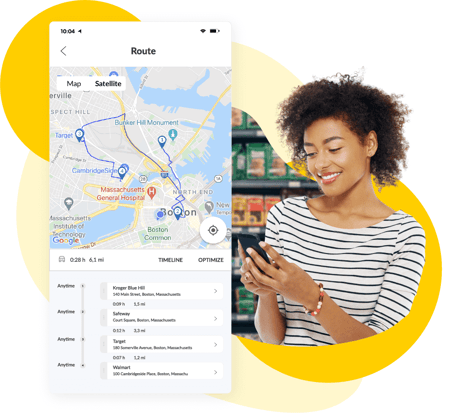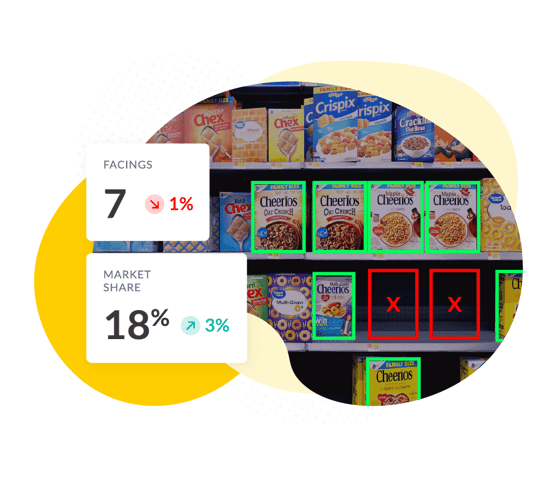Employers around the world are well aware of the ongoing labor and supply chain shortages impacting just about every industry for months on end, but few industries have been impacted as much as CPG as the global economy continues to recover from the pandemic. According to the Consumer Brands Association, unemployment in the retail industry has left 159,000 jobs from February 2020.
CPG companies are facing a true “labor crisis.” Due to U.S. and Canadian unemployment laws and benefits, many qualified workers are choosing to stay at home. And this crisis is only amplified by a number of contributing factors the world is facing: 1) increased consumer demand, 2) supply chain disruptions along almost every touchpoint and 3) a lack of workers willing to take roles that could increase their exposure to COVID-19. Due to these contributing factors, some grocers are receiving just 40 percent of what they ordered.

It’s becoming abundantly clear that many shelves will be empty well into 2023, and many field teams and retail stores will continue to be short-staffed. So what can brands and merchandising teams do to help guide their field teams through the ongoing labor shortages right now?
We recommend that they equip their field teams with new, modern technology that enables them to be as efficient and effective as possible out in the field in order to make the most out of their existing talent.
The truth is, a strong retail execution platform can’t solve for SKUs being out-of-stock if there is no product available. In today’s economy, there’s much out of the control for your field team. But here are things you may be able to control: 1) Control over your field team, where they go, and 2) the actions they take every day in the store. Within the areas that you can control, a consumer-grade retail execution platform is going to help them maximize their efficiency and effectiveness to solve problems in key accounts.

In this blog, we’ll cover 4 ways a modern retail execution platform can help guide your business through labor issues by deploying your most precious resources (your field team) more strategically.
Detailed Time & Mileage Dashboards
What is your current method of tracking how long your field reps are working each day? While it’s nice to know your reps are working full days, tracking key workday duration metrics is actually far more important for businesses to understand if coverage is properly being allocated. And with fewer reps than anticipated, it’s important they’re as efficient as possible in the field.
With a modern retail execution platform, brands and merchandisers will be able to track these key metrics below:
- Average time working in-store
- Average miles a day by rep
- Time in-store vs. time on the road
- Workday start and end time
- Number of hours a rep is working

For example, if every rep has agreed in their contract to work 8 hour days, but some routes require 10 hours to complete while other routes only require 5 hours, by taking a close look at how much time their reps spend in the store vs on the road and then comparing those metrics by team or territory, managers may find opportunities to improve territory allocation or personnel balance. And if you’re thinking right now, “I already have a time & mileage report,” bear in mind that if it only reports on total mileage for each field rep each week it just might not provide sufficient enough data.
Field managers can also go a level deeper and use these metrics to assess what could be causing an issue like low coverage. If territory coverage is low yet your team is already working 8 hour days, it may be time to hire additional reps and expand the team. If that isn’t the issue, by checking mileage per rep, field managers can assess if reps are spending too much time driving vs. inside key accounts, and adjust territories and schedules as needed.
Conversely, if coverage is low but your reps are only working 4-hour days, the issue may be getting the team to work full days. Whatever you uncover the issue to be, a detailed Time and Mileage dashboard is critical to every brand’s success in uncovering the why behind coverage challenges and helping them turn the right levers to improve coverage during trying times.
Store Prioritization of Key Accounts
Are your reps visiting the same accounts every week or month? How often are they changing their route based on the latest sales or execution data, or merchandising priorities?
Consider the opportunity cost of missing something at a key account that your field team didn’t plan to visit for another two weeks - because your routes are planned on schedules, not real-time demands. And with a short-staff, under this blanket coverage model, you may only be able to visit that store once a month. With a retail execution platform, your field team can be more intentional with every visit, making each day far more efficient in moving the needle.
Retail changes incredibly quickly and is always unpredictable. If a field team never updates or changes its routes and chooses to take a blanket coverage approach with all stores treated equally, then there’s a clear mismatch between the way this field team is approaching retail and the reality of how retail functions. Not all stores require the same amount of support and treatment. For example, a Kroger with a high priority in August may not be a high priority in September. But if the routes this team takes never change, they won’t be able to catch this change in priority.

A field team shouldn’t waste resources on accounts that aren’t revenue-driving if that means they’ll miss out on opportunities in other accounts where growth is attainable. A field rep should plan their week around a set of problems they want to solve in the field, rather than a set of accounts they want to visit. The first is a proactive approach while the latter is a reactive approach. Visiting accounts on a regular schedule is a guessing game and it’s not putting any of their prior fieldwork (data and knowledge) to use. While a rep may find an opportunity in an account, they may have wasted four visits to find it, which isn’t a good approach when you need every visit to count.
Understanding Shelf Conditions from Anywhere, Anytime
A modern retail execution platform becomes a game-changer in understanding shelf conditions and seeing data in near real-time, giving insight into any SKU from anywhere, which is crucial in guiding a short-rostered team to eliminate out-of-stocks and catch compliance errors early on.
Today’s top retail execution platforms also have automated OOS reporting to make sure your shelves aren’t sitting empty. With so much data readily available today, monitoring in-store conditions remotely through automated out-of-stock reporting can empower your team to make better decisions in the field by prioritizing store visits to limit the duration of OOS events, and to identify and correct the root causes of OOS—overall reducing the cost of OOS.

And with most grocery stores in North America still not fully staffed to pre-pandemic levels either, it’s even more important during the holidays that field teams are checking for compliance and OOS as many stores just don’t have enough bandwidth to be able to stock the shelves and do what they need to do around the stores.
Picture this: Your brand paid for a floor display in a major chain across North America to capitalize on a holiday, and those plans are not set up and displayed correctly, or sometimes even at all because that major chain is having challenges prioritizing the setup with staff. Since your team is now equipped with a modern retail execution platform, you’ve got real-time data on store conditions and sales, alerting you that sales haven’t improved since the display was intended to be set up. This is a great opportunity for a field rep to visit that account and see what the issue could be.
A Single Source of Truth
A huge time killer for many field teams is poor platform functionality and agility. If your reps work in multiple applications to place orders and submit data through email instead of a dedicated system, they’re missing out on potentially hundreds of store visits each year. Requiring built-in admin time during a rep’s schedule to send email recaps of their visits is a thing of the past with a modern retail execution platform.
For this, consider the following situation: It’s the end of the day and your field rep has two choices to make. 1) Make an additional visit/solve additional problems in the field or 2) Spend time putting together an email recap of their day. The number of opportunities that will be lost spending time sending emails will add up quickly for the entire team. And it could be one email at the end of the day that takes away from an additional store visit, or it could be half a day at the end of the week set aside for field reps to fill out reports. Not to mention the hard, hourly costs of paying a rep to do administrative work, instead of operating in the field. We’re talking $1000’s of wasted dollars a week supporting administration work that a purpose-built retail app could accomplish. This way of working will force your team to miss out on many opportunities in the field you cannot afford to miss.
A modern retail execution platform can navigate your supply chain and staffing challenges through real-time, adaptable reporting that gives you an informed forecast on your field needs, compliance, and account performance, enabling your business to make the most of the talent you have.







